152 posts
Latest Posts by alittleasteroide - Page 5
love letter from a scientist
I am not a poet. I am a scientist. I can measure the exact frequency of your voice when you speak my name, but I cannot explain how it resonates with such perfect clarity down my spine. I can describe the process by which you inherited your mother’s hair and your father’s smile, but I cannot explain where the twinkling galaxies in your eyes came from. I am baffled by the apparent gravitational anomaly that draws me to you with a force far too great for your size. I know of no way to quantify the volume of your presence in a room.
I am not a poet. I am a scientist. Prose is not my specialty. I will never be able to combine words to craft sonorous verses as easily as I combine chemicals in a flask, but know this – to me, you are every bit as fascinating as the view through a microscope. To me, you are a mystery greater than any cat in a box, and are fraught with as much uncertainty. Each day brings new understanding of you, and the knowledge that there is still far more to discover.
I am not a poet. I am a scientist, and there is nothing a scientist loves more than the the pursuit of discovery.
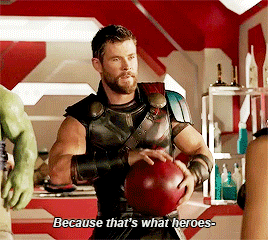

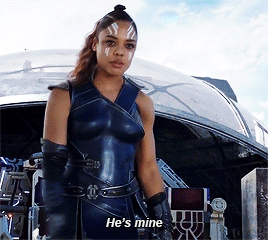


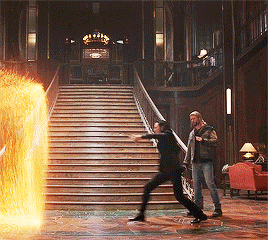
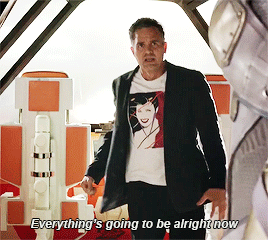
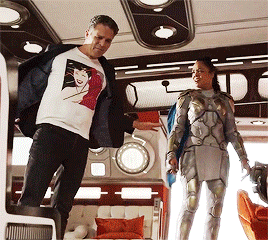
the revengers: they’re trying
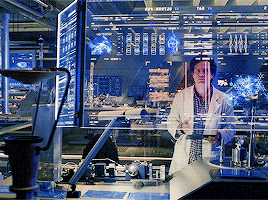
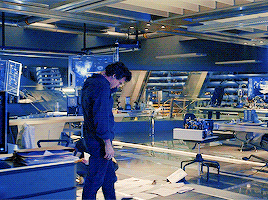

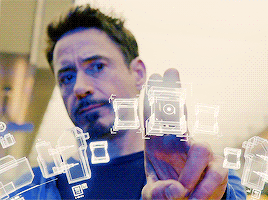

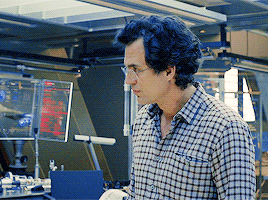
tony and bruce working together
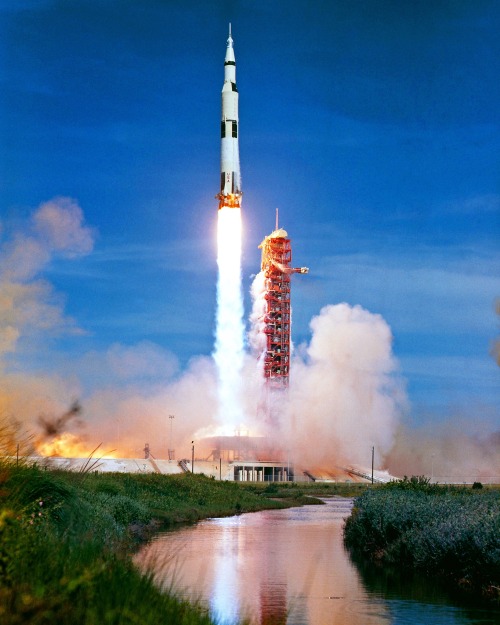
Riverside launch. The Saturn V lifts off Launch Pad 39B at Kennedy Space Center for Apollo 15, July 1971. The 4th mission to land on the moon was the first ‘J Mission’, which involved 3-day lunar stays instead of 2. David Scott & James Irwin became 7th & 8th to walk on the moon as they landed near Hadley Rille while Command Module Pilot Al Worden orbited 74 times overhead. The 12-day mission also brought the Lunar Rover as Scott became the first to drive on the moon.
Oh shit!!! Hear that alarm go off??⏰⏰⏰
YOU KNOW WHAT THAT MEANS
It’s........
BRUCE BANNER LOVING HOURS!!💜💚💜💚💜💚💜💚
But wait! Did you forget to set your clock for it? No worries!
Because the best part is.............
ITS ALWAYS BRUCE BANNER LOVING HOURS

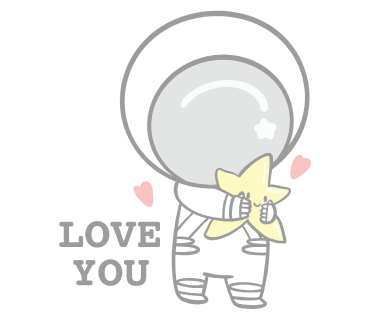

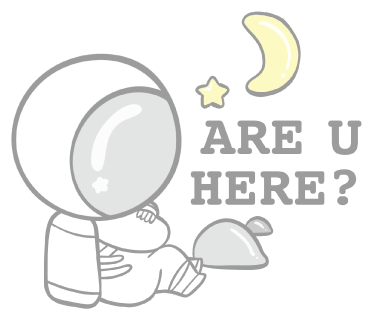

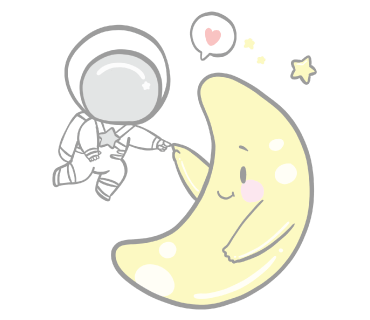
Astronaut and Star : Into the Galaxy


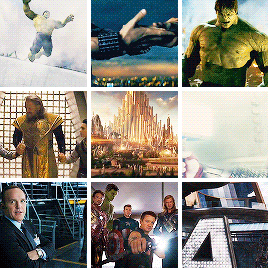


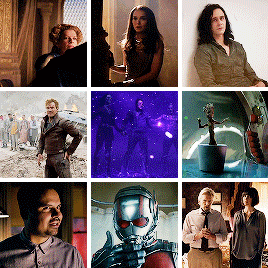

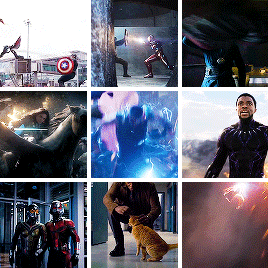

The Infinity Saga (2008-2019)
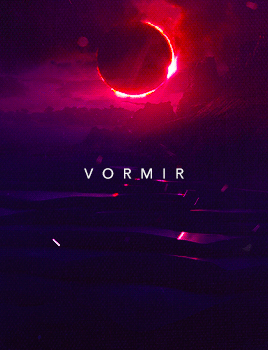
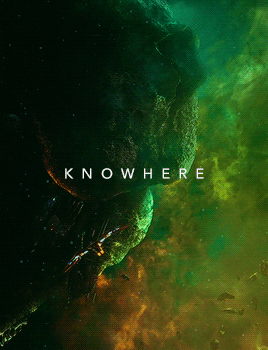
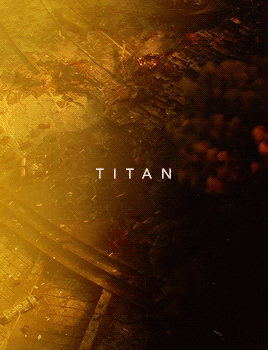
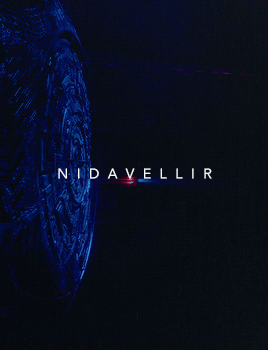
Infinity War Locations

Advents calendar art #9! Hulk is being very helpful, yes ;V



Tumblr has forced me to format these like a shitty slideshow presentation because they don’t allow more than 10 images per post so enjoy this Cringe Compilation of 2019 art by me
Reblogs are so much cooler than likes but it’s cool if you can’t too I Guess
Ko-fi | Ask me about commissions









Source See more facts HERE






part of the journey is the end
If you’re still in the mood to sketch astronauts do you think you could do Mike Collins? I lovedddd your little Neil drawing he’s so cute !!
Anon I am ALWAYS in the mood to do astronauts!!! And thanks so much love, here’s a Mike for you!! ^^

He’s just havin’ a hang
“Hulk doesn’t want friends, because friends will hurt him. Everyone hurts him. Everyone hurts Hulk.”
— Hulk; Hulk: The End (via paragonrobits)
Galactic Ghouls and Stellar Screams
A quiet, starry night sky might not seem like a very spooky spectacle, but space can be a creepy place! Monsters lurk in the shadowy depths of the universe, sometimes hidden in plain sight. Many of them are invisible to our eyes, so we have to use special telescopes to see them. Read on to discover some of these strange cosmic beasts, but beware — sometimes fact is scarier than fiction.
Monster Black Holes ⚫

You know those nightmares where no matter how fast you try to run you never seem to get anywhere? Black holes are a sinister possible version of that dream — especially because they’re real! If you get too close to a black hole, there is no possibility of escape.
Just last year our Fermi Gamma-ray Space Telescope traced an otherworldly ghost particle back to one of these monster black holes, providing additional insight into the many signals we’re picking up from some of the most feared creatures in the cosmic deep.
But it gets worse. Our Hubble Space Telescope revealed that these things are hidden in the hearts of nearly every galaxy in the universe. That means supermassive black holes lurk in the shadows of the night sky in every direction you look!
A Hazy Specter 👻

This fiendish specter lives in the center of the Milky Way, haunting our galaxy’s supermassive black hole. But it’s not as scary as it looks! Our SOFIA observatory captured streamlines tracing a magnetic field that appears to be luring most of the material quietly into orbit around the black hole. In other galaxies, magnetic fields seem to be feeding material into hungry black holes — beware! Magnetic fields might be the answer to why some black holes are starving while others are feasting.
Bats in the Belfry 🦇

The universe has bats in the attic! Hubble spotted the shadow of a giant cosmic bat in the Serpens Nebula. Newborn stars like the one at the center of the bat, called HBC 672, are surrounded by disks of material, which are hard to study directly. The shadows they cast, like the bat, can clue scientists in on things like the disk’s size and density. Our solar system formed from the same type of disk of material, but we can only see the end result of planet building here — we want to learn more about the process!
Jack-o-lantern Sun 🎃

A jack-o-lantern in space?! Our Solar Dynamics Observatory watches the Sun at all times, keeping a close eye on space weather. In October 2014, the observatory captured a chilling image of the Sun with a Halloweenish face!
Skull Comet 💀

On Halloween a few years ago, an eerie-looking object known as 2015 TB145 sped across the night sky. Scientists observing it with our Infrared Telescope Facility determined that it was most likely a dead comet. It’s important to study objects like comets and asteroids because they’re dangerous if they cross Earth’s path — just ask the dinosaurs!
Halloween Treat 🍬

Trick-or-treat! Add a piece of glowing cosmic candy to your Halloween haul, courtesy of Hubble! This image shows the Saturn Nebula, formed from the outer layers ejected by a dying star, destined to be recycled into later generations of stars and planets. Our Sun will experience a similar fate in around five billion years.
Witch’s Broom Nebula 🧹

Massive stars are in for a more fiery fate, as the Witch’s Broom Nebula shows. Hubble’s close-up look reveals wisps of gas — shrapnel leftover from a supernova explosion. Astronomers believe that a couple of supernovae occur each century in galaxies like our own Milky Way.
Zombie Stars 🧟

Supernovae usually herald the death of a star, but on a few occasions astronomers have found “zombie stars” left behind after unusually weak supernovae. Our Nuclear Spectroscopic Telescope Array (NuSTAR) has even spotted a mysterious glow of high-energy X-rays that could be the “howls” of dead stars as they feed on their neighbors.
Intergalactic Ghost Towns 🏚️

The universe is brimming with galaxies, but it’s also speckled with some enormous empty pockets of space, too. These giant ghost towns, called voids, may be some of the largest things in the cosmos, and since the universe is expanding, galaxies are racing even farther away from each other all the time! Be grateful for your place in space — the shadowy patches of the universe are dreadful lonely scenes.
Mysterious Invisible Force 🕵️♀️

Some forces are a lot spookier than floorboards creaking or a door slamming shut unexpectedly when you’re home alone. Dark energy is a mysterious antigravity pressure that our Wide Field Infrared Survey Telescope (WFIRST) is going to help us understand. All we know so far is that it’s present everywhere in the cosmos (even in the room with you as you read this) and it controls the fate of the universe, but WFIRST will study hundreds of millions of galaxies to figure out just what dark energy is up to.
Want to learn some fun ways to celebrate Halloween in (NASA) style? Check out this link!
Make sure to follow us on Tumblr for your regular dose of space: http://nasa.tumblr.com

RAAAHHHH!!!
this is how mark responded to being one of the top ten most searched actors on twitter, confirmed: mark ruffalo has a stan account


…in case it wasn’t clear, I love him
Ko-fi | Reblogs are very much appreciated, because I worked uber hard on this :)

Hulk by Nic Klein.
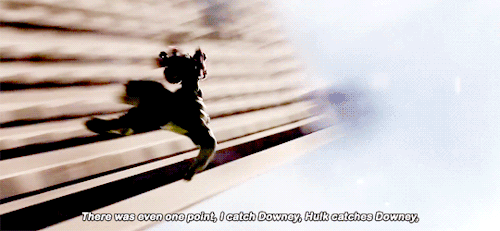





Mark Ruffalo Breaks Down His Most Iconic Characters (x)

![[Don’t Press Like If You Won’t Reblog]](https://64.media.tumblr.com/8fc820565010e48c6e0060637c115b7d/7399c4d43d6aa125-1d/s500x750/4f5a018537988e1b05053a9d6c72394b8037ddae.png)
[Don’t press like if you won’t reblog]
When we reach our lowest point…

my flash animation final: Thor vs Bruce
instagram | twitter

Endeavor Getting Moved …
Just a casual drive down the street!
Astronaut tweets
























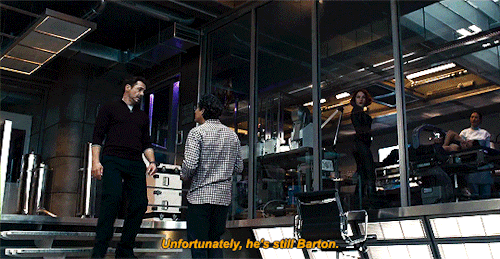
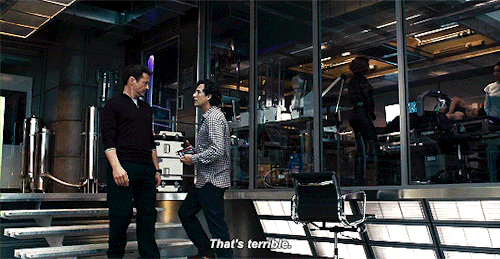

“What are you wearing?”
Wip for a friend <3






First All-Woman Spacewalk
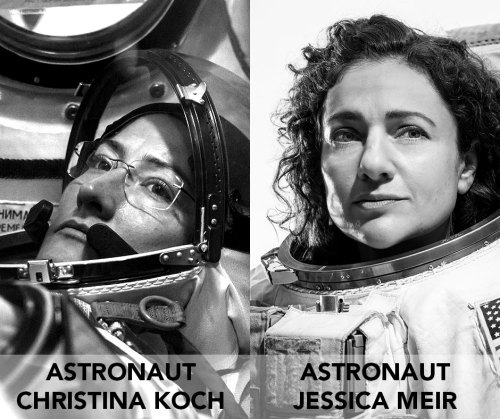
NASA astronauts and best friends, Christina Koch and Jessica Meir, made history Friday, October 18, 2019, by conducting the first all-woman spacewalk outside the International Space Station (ISS)! The Expedition 61 flight engineers ventured into the vacuum of space at 7:38 a.m. EDT to swap out a failed power controller that regulates the batteries used to collect and distribute power to the orbital laboratory – a task that took a total of seven hours and 17 minutes to complete.
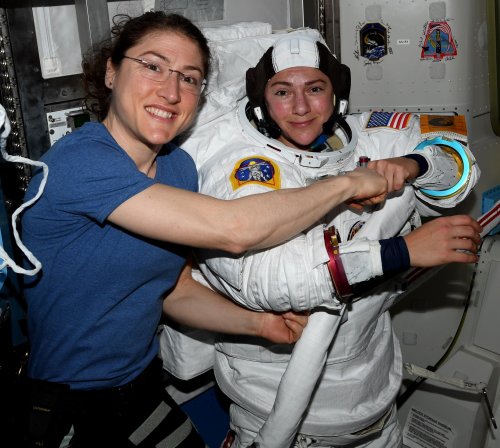
This was Koch’s fourth spacewalk and Meir’s first. Both women, selected as astronaut candidates in 2013, are on their first trip to work and live aboard the space station. Meir will be the 15th woman to spacewalk, and the 14th U.S. woman.
Get to know the astronauts
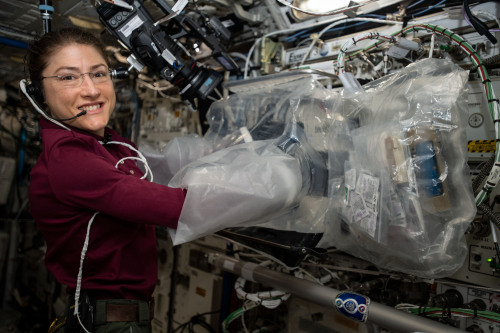
In addition to being an astronaut, Christina Koch is an engineer and physicist. Her career has taken her to extreme parts of the planet to conduct scientific field missions in places like the Antarctic South Pole and Greenland’s Summit Station. Prior to being selected as an astronaut candidate in 2013, she worked as an Electrical Engineer at our Goddard Space Flight Center’s Laboratory for High Energy Astrophysics.
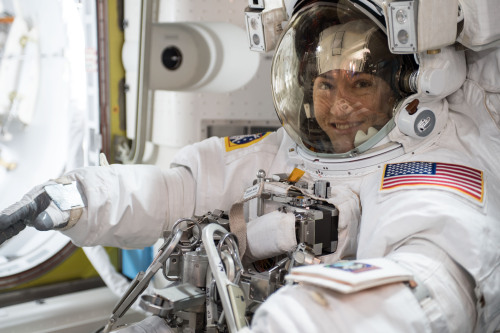
Koch left Earth on March 14, 2019, and is slated to set a record for the longest single spaceflight by a woman with an expected total of 328 days in space. Her extended mission will provide researchers the opportunity to observe the effects of long-duration spaceflight on a female body in preparation for human missions to the Moon and Mars.
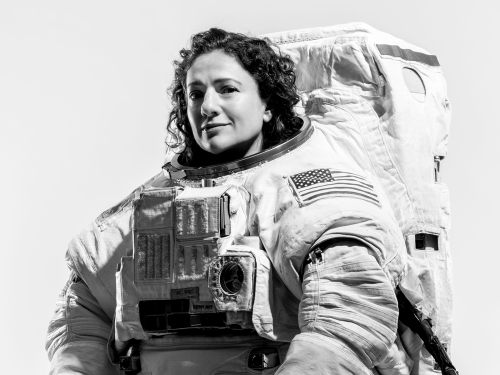
Jessica Meir dreamed of the day she would make it to space since the age of five. That dream became a reality on Wednesday, Sept. 25, 2019 as she left Earth on her first spaceflight – later floating into her new home aboard the International Space Station.
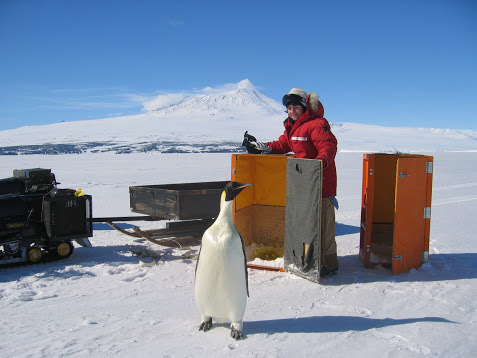
While Meir’s new home is more than 200 miles over the Earth, she is no stranger to extreme environments. She studied penguins in Antarctica and mapped caves in Italy – both of which prepared her for the ultimate extreme environment: space.
#AllWomanSpacewalk, what’s the deal?
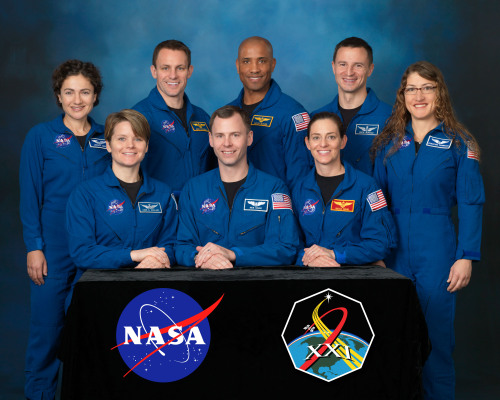
The all-woman spacewalk wasn’t something we purposefully planned; it is a testament to the increasing number of female astronauts in the space program. For example, Koch’s and Meir’s 2013 class of astronaut candidates was 50 percent women!
When asked in an interview about the importance of conducting her mission and this spacewalk, Koch said,
“In the end, I do think it’s important, and I think it’s important because of the historical nature of what we’re doing. In the past women haven’t always been at the table. It’s wonderful to be contributing to the space program at a time when all contributions are being accepted, when everyone has a role. That can lead in turn to increased chance for success. There are a lot of people who derive motivation from inspiring stories of people who look like them, and I think it’s an important story to tell.”
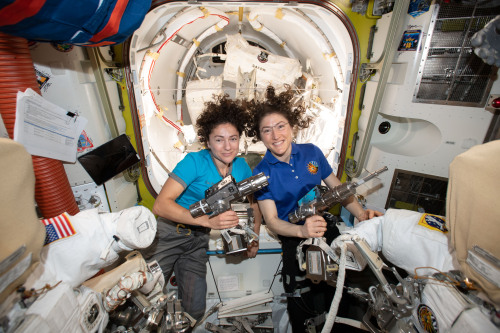
It’s important to note that spacewalks are not easy; astronauts typically describe them as the most physically challenging thing they do. Assignments are made on the basis of which astronauts are the best prepared to accomplish the tasks at hand under the conditions at the time. Today, Koch and Meir were the top astronauts for the job.
Women are no stranger to spacewalks!

While this was the first spacewalk to be conducted entirely by women, women are no strangers to spacewalks. Exactly 35 years and one week ago, Kathryn Sullivan (pictured above) made her own historic debut as the first U.S. woman to conduct a spacewalk. Since then, a total of 14 women (15 including Jessica) have ventured into the vacuum of space on 40 different spacewalks. Former Astronaut Peggy Whitson performed a record number of 10! From Astronauts to mission directors, women have been making their mark at the agency for decades now. A few of our recent pioneers are:
Astronaut Kate Rubins: First person to sequence DNA in space
Astronaut Peggy Whitson: First woman to command the ISS
Sandra Cauffman: Director of our Earth Science’s Division
Nicola Fox: Director of our Heliophysics Division
Lori Glaze: Director of our Planetary Science Division
Coming soon: The first woman to walk on the Moon
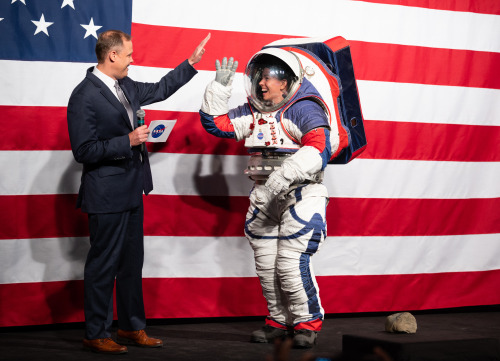
The first all-woman spacewalk is a milestone worth noting and celebrating as we look forward to putting the first woman and the next man on the Moon by 2024 with our Artemis lunar exploration program. With today’s historic event, we once again set a precedence for women to lead in space exploration.
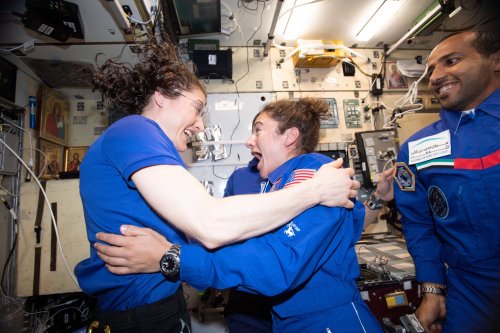
We hope achievements such as this provide inspiration to you all around the world, proving that hard work can lead you to great heights. This is not just a historic day for NASA, but a moment we can all feel proud of.
Didn’t have time to tune in? Check out the replay, here. Koch was wearing the spacesuit with red stripes, while Meir’s had no stripes.
If you’d like to keep up with Christian Koch and Jessica Meir’s work 254 miles above planet Earth, follow them on Twitter at @Astro_ Christina and @Astro_Jessica.
Be sure to follow us on Tumblr for your regular dose of space: http://nasa.tumblr.com